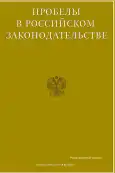Family and Legal Aspects of the Use of Assisted Reproductive Technologies
- Авторлар: Rumyantseva N.S.1, Shepeleva D.V.1,2
-
Мекемелер:
- Kutafin Moscow State Law University (MSAL)
- Financial University under the Government of the Russian Federation
- Шығарылым: Том 16, № 1 (2023)
- Беттер: 91-97
- Бөлім: Private Law (Civil) Sciences
- URL: https://journal-vniispk.ru/2072-3164/article/view/250299
- ID: 250299
Дәйексөз келтіру
Аннотация
The relevance of the study of family and legal aspects of the use of assisted reproductive technologies is due to the fact that assisted reproductive technologies have a significant place in Russian family law, and the regulatory framework on this issue is still being formed, and judicial practice and government policy contribute to this in many ways, since the protection of motherhood and childhood has public legal significance for Russia. This value acquired the strongest coloring in the light of the addition of legislation by Decree of the President of the Russian Federation No. 809 dated 09.11.2022, approving the foundations of state policy for the preservation and strengthening of traditional Russian spiritual and moral values, determining that Russia's policy proceeds from the priority of traditional spiritual and moral values, among which such factors as a strong family, marriage (union of a man and a woman), having many children. Assisted reproductive technologies can have both a positive impact on these factors and a negative impact, since there is no holistic mechanism of responsibility of the parties participating in assisted reproductive technologies. Therefore, the main purpose of the article will be to study assisted reproductive technologies, the need for their imperative regulation, data gaps of private legal relations between the parties - parents (customers), surrogate mother, donors. In conclusion, the problems of access to assisted reproductive technologies for certain categories of persons referred to as «non-married couples», the problems of protecting the rights of potential parents of a child in relation to a surrogate mother are highlighted, the imbalance of rights between potential parents and a surrogate mother is noted, the need for imperative regulation of relations related to the use of assisted reproductive technologies in order to protect the basics of motherhood, childhood and ensuring the stable development of the institution of the family as a constitutional value.
Толық мәтін
##article.viewOnOriginalSite##Авторлар туралы
Natalia Rumyantseva
Kutafin Moscow State Law University (MSAL)
Хат алмасуға жауапты Автор.
Email: nsrumyantzeva@yandex.ru
ORCID iD: 0000-0001-7446-8501
SPIN-код: 6831-3342
Cand. Sci. (Law), Senior Lecturer of the Family and Housing Law Department
Ресей, MoscowDina Shepeleva
Kutafin Moscow State Law University (MSAL); Financial University under the Government of the Russian Federation
Email: dvshep0904@gmail.com
ORCID iD: 0000-0001-7661-4533
SPIN-код: 4109-6343
Cand. Sci. (Law), Associate Professor of the Family and Housing Law Department; Associate Professor of the Department of International and Public Law
Ресей, Moscow; MoscowӘдебиет тізімі
- Bychkov A.G. «Legal regulation of assisted reproductive technologies»// Legal guide of the head. - 2021. №. 12. - pp. 66-75.
- Gerkulov D.A. «The use of vitrified donor oocytes in ART programs»// [Electronic resource].- Access mode – URL.: https://rahr.ru/d_pech_mat_konf/Tezis_RARCH_2022.pdf.
- Gorskaya E.Yu. «Trends in the introduction of information about parents in the record of the birth certificate» // SPS Consultant Plus.
- Egorov K.V., Egorova E.S. Assisted reproductive technologies: problems of patients' legal capacity // Civil law. 2022. - №. 4. P. 17 – 20// SPS Consultant Plus.
- Isupova O.G. «Assisted reproductive technologies: new opportunities» // [Electronic resource].- Access mode – URL.:https://publications.hse.ru/mirror/pubs/share/direct/210737205
- Korneev I.A. «Assisted reproductive technologies in men: indications for use, recommendations for examination and preparation for treatment»// [Electronic resource].- Access mode – URL.: https://www.elibrary.ru/download/elibrary_44405425_22477395.pdf.
- Ksenofontova D.S. «Legal foundations of gene therapy: in search of a balance of interests»// SPS Consultant Plus.
- Mkhitaryan M.K., Mkrtchyan T.M., Chogovadze A.G. «The psychological side of the issue of using donor material in ART procedures»// [Electronic resource].- Access mode – URL.: https://rahr.ru/d_pech_mat_konf/Tezis_RARCH_2022.pdf.
- Nazarenko T.A. To date, the average age of IVF patients was 34.5 years. The share of single women after 40 years and women who want to save their oocytes for delayed childbirth is growing// T.A. Nazarenko «Opportunities and prospects for the development of ART»// [Electronic resource].- Access mode – URL.: https://rahr.ru/d_pech_mat_konf/Tezis_RARCH_2022.pdf.
- Pozdnyakova L.S. «Gaps in the legal regulation of the activities of medical organizations using ART. Solutions»// Collection of abstracts of speeches of participants of the XXXII Annual International Conference of the Russian Association of Human Reproduction, 2022.- pp. 17-19 [Electronic resource].- Access mode – URL.: https://rahr.ru/d_pech_mat_konf/Tezis_RARCH_2022.pdf.
- Popov V.P. «Legal problems of prevention of falsification in the field of assisted reproductive technologies» // Gaps in Russian legislation. – 2020. - №. 5, Vol. 13.- pp. 288-292.
- Ratnikov S.V. «To protect surrogate motherhood in Russia — to save the country from child trafficking»// [Electronic resource].- Access mode – URL.: https://www.rahr.ru/d_pech_mat_konf/tez2021.pdf.
- Saveliev D.B. Agreements in the family sphere: a textbook. Moscow: Prospect, 2017. p. -144.
- Filippova G.G. «Psychology in ART: a review of foreign and domestic research» [Electronic resource].- Access mode – URL.: https://rahr.ru/d_pech_mat_konf/Tezis_RARCH_2022.pdf.
- Chikin V.V. «The concept of state protection and family support in modern Russia»//Bulletin of the Faculty of Jurisprudence and Juvenile Justice of the RSSU. Issue 3/ Under the general editorship of Candidate of Law, Associate Professor Z.V. Solomko.- M.: APKiPPRO. - 2009. №. 3. - p. 261.
Қосымша файлдар








